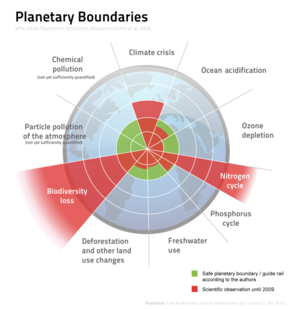Ecological crisis: Difference between revisions
From BurnZero
No edit summary |
No edit summary |
||
| Line 1: | Line 1: | ||
[[File:Planetary Boundaries.png|alt=Planetary Boundaries|thumb|Planetary Boundaries]] | [[File:Planetary Boundaries.png|alt=Planetary Boundaries|thumb|Planetary Boundaries]] | ||
''Noone can say 100% that the world will end | ''Noone can say 100% that the world will end definitely in 5 years time, but perhaps for a moment we do a thought experiment and imagine we know it will. That sea levels will rise, that 1.5C will occur leading to crop failures and mass migration from poorer countries. Actually extremely unlikely that the following:'' | ||
* '''Climate change''' - s''ince records began in 1880, nineteen of the twenty hottest years have occured since 2000''<ref>NASA, Global Temperature: https://climate.nasa.gov/vital-signs/global-temperature/</ref>''.'' | * '''Climate change''' - s''ince records began in 1880, nineteen of the twenty hottest years have occured since 2000''<ref>NASA, Global Temperature: https://climate.nasa.gov/vital-signs/global-temperature/</ref>''.'' | ||
*'''Biodiversity loss''' - there has been a 68% average decline in the population sizes of mammals, birds, amphibians, reptiles, and fish between 1970 and 2016<ref>IPBES, Media Release, Nature’s Dangerous Decline ‘Unprecedented’; Species Extinction Rates ‘Accelerating’ May 2019</ref>. | *'''Biodiversity loss''' - there has been a 68% average decline in the population sizes of mammals, birds, amphibians, reptiles, and fish between 1970 and 2016<ref>IPBES, Media Release, Nature’s Dangerous Decline ‘Unprecedented’; Species Extinction Rates ‘Accelerating’ May 2019</ref>. | ||
Revision as of 21:07, 10 February 2022
Noone can say 100% that the world will end definitely in 5 years time, but perhaps for a moment we do a thought experiment and imagine we know it will. That sea levels will rise, that 1.5C will occur leading to crop failures and mass migration from poorer countries. Actually extremely unlikely that the following:
- Climate change - since records began in 1880, nineteen of the twenty hottest years have occured since 2000[1].
- Biodiversity loss - there has been a 68% average decline in the population sizes of mammals, birds, amphibians, reptiles, and fish between 1970 and 2016[2].
- Deforestation - more than half the world’s tropical forests have been destroyed since the 1960s[3].
- Ocean acidification - more CO2 in the atmosphere means more acidity in the oceans.
- Ozone depletion
- Microplastics via overconsumption.
- the nitrogen cycle
- the phosphorus cycle
These issues combined are accelerating us towards collapse.
References
- ↑ NASA, Global Temperature: https://climate.nasa.gov/vital-signs/global-temperature/
- ↑ IPBES, Media Release, Nature’s Dangerous Decline ‘Unprecedented’; Species Extinction Rates ‘Accelerating’ May 2019
- ↑ International Union for Conservation of Nature. (2021, February). Deforestation and forest degradation. https://www.iucn.org/resources/issues-briefs/deforestation-and-forest-degradation
